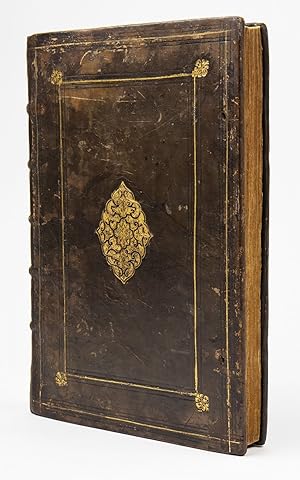Descripción
[Bound with, as issued:] The End of Nero and Beginning of Galba. Fower Bookes of The Histories of Cornelius Tacitus. The Life of Agricola. The second edition. London: [By Edm. Bollifant, for Bonham and Iohn Norton], 1598 Folio: 30 x 20.7 cm. [8], 271, [1] p. (1st 2 p. blank) Collation: [par.]â A-Yâ Zâ (1st leaf blank save sig. mark); [6], 12, 227, [3] p. (last 3 p. blank) Collation: [par.]â A-Sâ Tâ Vâ (las leaf blank). FIRST EDITION of the "Annales". SECOND EDITION of the "Histories". The "Histories" and "Agricola" were translated by Richard Greenwey. The translations of the "Annales" and "Germania" are the work of Sir Henry Savile (first ed. 1591). Bound in contemporary English calf (scuffed, moderate wear; skillfully rebacked, original spine elements preserved), boards ruled in gold and blind, gilt ornaments at the corners, large, ornate gilt arabesque at the center of each board. Text is excellent condition with a few trivial marginal tears, a few minor stains, and a closed tear to one leaf (not affecting the text.) Complete with the first leaf (blank except for sig. mark) and the final leaf, blank. Woodcut initials, large schematic engraving of a Roman military camp. Contemp. price in ink at head of title. Provenance: Viscount Mersey, Bignor Park (bookplate.) Tacitus witnessed both the horror of Domitian's tyrannical reign -a reign that ended with the emperor's murder- and the benevolent rule of Trajan. The former marked the lowest point of corruption to which the principate had fallen. The latter brought with it the promise of a restored system of adoptive emperors, a model that Tacitus himself offered the greatest promise of maintaining a stable and cohesive empire. Tacitus' two historical works, the "Histories" and "Annales", cover the years 69 to 96 A.D., the years from the death of Nero to the death of Domitian, and the earlier reigns of the Julio-Claudian emperors (beginning with the death of Augustus), respectively. Their tone is rather dark; the "Annales" begins with a discussion of whether or not Augustus' wife had poisoned him. The "Histories" opens with the chaotic power-grab that followed Nero's murder, the so-called "year of the four emperors". The picture that emerges is one of violence, dishonesty and injustice. In contrast to this dark tone, Tacitus' "Agricola", in which he recounts the noble, honorable and heroic deeds of his father-in-law, Julius Agricola, stands as a testament to all that is positive and good in a true leader. Agricola, an imperial officer under Domitian, was responsible in large part for the conquest of Britain. In praising Agricola's character, Tacitus emphasizes how, as governor of Britain and head of an army at war, he had been able to serve the state faithfully, honorably and well even under a terrible tyrant such as Domitian. "Tacitus' historical work began while he was in the midst of public activity. The 'Agricola', whose subject is his father-in-law's life and work (especially in Britain, with some ethnographical detail), seems to have been 'published' in 98; and the 'Germania', a primarily geographical and ethnographic work on that important area on the fringe of the empire, shortly thereafter. "Of the major works of Tacitus, 'Historiae' and 'Annales' as they are now called, the former was perhaps already in progress when the minor works began to appear. The subject of the 'Historiae' is the years 69 to 96, and may have been completed by 110 in 12 or 14 books, of which only I-IV and part of V, covering the year 69-70, survive today. The end of Tacitus' life was devoted to the writing of the 'Annales' in 18 or 16 books, in which he went back and began annalistic treatment 'ab excessu divi Augusti'. Of this work there survive only Books I-VI and XI-XVI. (Ulery, 'Tacitus', CTC VI) "Tacitus' plan for a long historical work was already present in the Agricola, where, in one of the early chapters, Tacitus expresses his intention to narrate the years of Domitian's tyranny and t. N° de ref. del artículo 4299
Contactar al vendedor
Denunciar este artículo
![]()




